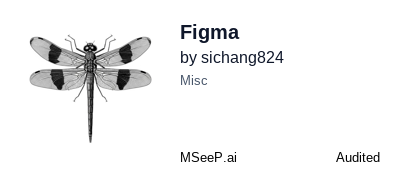[](https://mseep.ai/app/sichang824-mcp-figma)
# Figma MCP Server
A Figma API server implementation based on Model Context Protocol (MCP), supporting Figma plugin and widget integration.
## Features
- Interact with Figma API through MCP
- WebSocket server for Figma plugin communication
- Support for Figma widget development
- Environment variable configuration via command line arguments
- Rich set of Figma operation tools
## Installation
1. Clone the repository:
```bash
git clone <repository-url>
cd figma-mcp
```
2. Install dependencies:
```bash
bun install
```
## Configuration
### Environment Variables
Create a `.env` file and set the following environment variables:
```
FIGMA_PERSONAL_ACCESS_TOKEN=your_figma_token
PORT=3001
NODE_ENV=development
```
### Getting a Figma Access Token
1. Log in to [Figma](https://www.figma.com/)
2. Go to Account Settings > Personal Access Tokens
3. Create a new access token
4. Copy the token to your `.env` file or pass it via command line arguments
## Usage
### Build the Project
```bash
bun run build
```
### Run the Development Server
```bash
bun run dev
```
### Using Command Line Arguments
Support for setting environment variables via the `-e` parameter:
```bash
bun --watch src/index.ts -e FIGMA_PERSONAL_ACCESS_TOKEN=your_token -e PORT=6000
```
You can also use a dedicated token parameter:
```bash
bun --watch src/index.ts --token your_token
```
Or its shorthand:
```bash
bun --watch src/index.ts -t your_token
```
## Configuring MCP in Cursor
Add to the `.cursor/mcp.json` file:
```json
{
"Figma MCP": {
"command": "bun",
"args": [
"--watch",
"/path/to/figma-mcp/src/index.ts",
"-e",
"FIGMA_PERSONAL_ACCESS_TOKEN=your_token_here",
"-e",
"PORT=6000"
]
}
}
```
## Available Tools
The server provides the following Figma operation tools:
- File operations: Get files, versions, etc.
- Node operations: Get and manipulate Figma nodes
- Comment operations: Manage comments in Figma files
- Image operations: Export Figma elements as images
- Search functionality: Search content in Figma files
- Component operations: Manage Figma components
- Canvas operations: Create rectangles, circles, text, etc.
- Widget operations: Manage Figma widgets
## Figma Plugin Development
### Plugin Introduction
Figma plugins are customized tools that extend Figma's functionality, enabling workflow automation, adding new features, or integrating with external services. This MCP server provides a convenient way to develop, test, and deploy Figma plugins.
### Building and Testing
Build the plugin:
```bash
bun run build:plugin
```
Run in development mode:
```bash
bun run dev:plugin
```
### Loading the Plugin in Figma

1. Right-click in Figma to open the menu -> Plugins -> Development -> Import plugin from manifest...
2. Select the plugin's `manifest.json` file
3. Your plugin will now appear in Figma's plugin menu
### Plugin Interaction with MCP Server
Plugins can communicate with the MCP server via WebSocket to achieve:
- Complex data processing
- External API integration
- Cross-session data persistence
- AI functionality integration
## Development
### Build Widget
```bash
bun run build:widget
```
### Build Plugin
```bash
bun run build:plugin
```
### Development Mode
```bash
bun run dev:widget # Widget development mode
bun run dev:plugin # Plugin development mode
```
## License
MIT